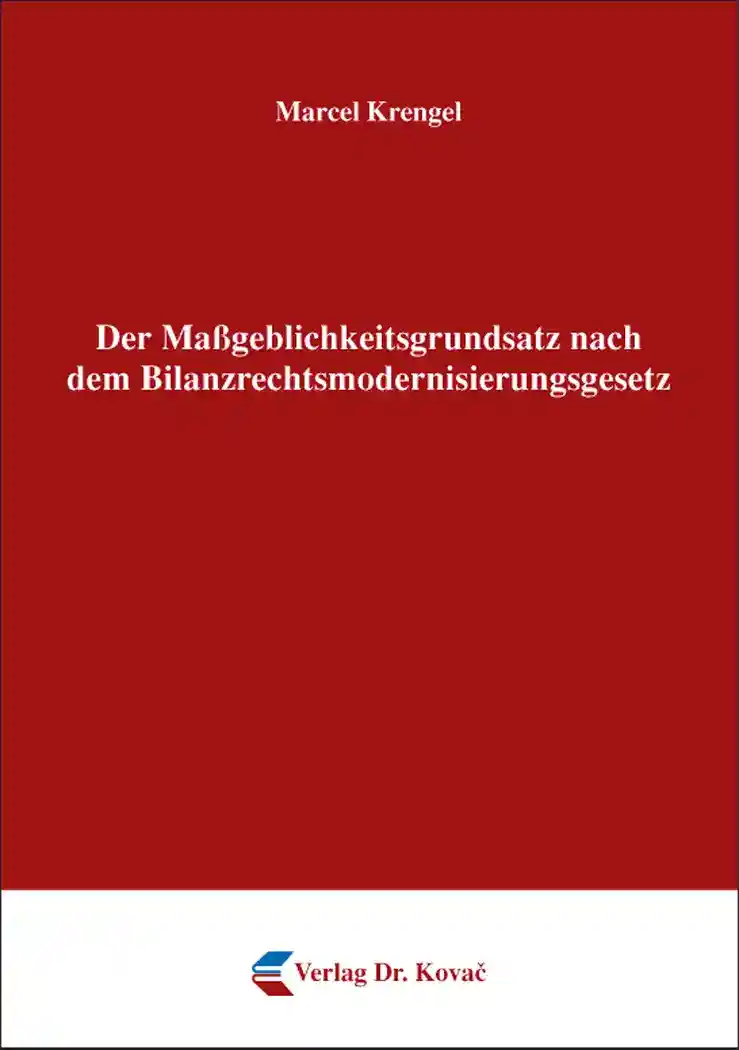Marcel KrengelDer Maßgeblichkeitsgrundsatz nach dem Bilanzrechtsmodernisierungsgesetz
Steuerrecht in Forschung und Praxis, volume 106
Hamburg 2014, 402 pages
ISBN 978-3-8300-7661-2 (print) |ISBN 978-3-339-07661-8 (eBook)
About this book deutschenglish
The taxation of tradesmen is the most important governmental instrument of generating money. Therefore, taxpayers should expect clear legal parameters – but this is not the case. The German Income Tax Act orders the consideration of the Statements of Standard Accounting Practice of the commercial law in order to determine the profit as authoritative basis of taxation of merchants and traders. This so-called principle that the treatment followed for book purposes is to be adopted in the tax balance sheet links commercial and tax law for the purpose of simplification for the subjects to taxation. However, this seemingly clear legal statement faces numerous perforations and is doubted by influential circles. An independent tax accounting law and the complete decoupling of the determination of the taxable income from the commercial law is what many people in research and practice favor. The Accounting Law Modernization Act stimulated these discussions, even though the legislature intended to uphold the principle that the treatment followed for book purposes is to be adopted in the tax balance sheet. It is obvious that uncertainty is difficulty to bear in such a fundamental area of law. The author therefore goes through a thorough study of the question of whether the Accounting Law Modernization Act abolished the principle that the treatment followed for book purposes is to be adopted in the tax balance sheet or whether it may even have strengthened it. The investigation begins with introductory considerations on the character and historical development of the principle that the treatment followed for book purposes is to be adopted in the tax balance sheet. Afterwards, a short comparative law perspective is taken in. Subsequently, the principle that the treatment followed for book purposes is to be adopted in the tax balance sheet is discussed under each relevant aspect of the Accounting Law Modernization Act. It is started with the importance of the abolition of the reversed dependency as the most striking content of the law. Then the work attends to the question of the continued existence of the formal dependency. The newly introduced optional caveat and its range form the next topic before the controversial scope of manufactural costs is investigated (taking into account the Income Tax Alteration Guidelines 2012), being followed by an exposure of the areas of application of the material dependency after the Accounting Law Modernization Act. The question of the scope of the general tax proviso in § 5 par. 6 Income Tax Act – especially focussing on current-value depreciations and pension provisions – follow an outlook and the overall result. There are numerous publications in scientific journals coping with the principle that the treatment followed for book purposes is to be adopted in the tax balance sheet, specifically after the Accounting Law Modernization Act. The present work summarizes the facts of the case and the status of the dispute about the current range of the principle that the treatment followed for book purposes is to be adopted in the tax balance sheet for the first time in one disquistion and examines it under every relevant aspect of the Accounting Law Modernization Act in depth, finding a result which differs from the prevailing view.Keywords
BilanzrechtBilMoGBuchführungspflichtEinkommensteuer-RichtlinienGrundsätze ordnungsgemäßer BuchführungHandelsbilanzHandelsrechtHerstellungskostenLeistungsfähigkeitsprinzipMaßgeblichkeitsgrundsatzPensionsrückstellungenSteuerbilanzSteuerrechtTeilwertabschreibungenWahlrechtsvorbehaltIhr Werk im Verlag Dr. Kovač

Möchten Sie Ihre wissenschaftliche Arbeit publizieren? Erfahren Sie mehr über unsere günstigen Konditionen und unseren Service für Autorinnen und Autoren.
